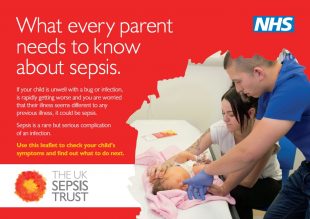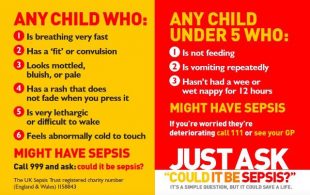 Health visitors and school nurses are often the primary health contact point for parents and carers of children aged between 0-19 years. Together with other health professionals, they have a key role in providing advice or support for parents to allay fears or concerns about sepsis.
Health visitors and school nurses are often the primary health contact point for parents and carers of children aged between 0-19 years. Together with other health professionals, they have a key role in providing advice or support for parents to allay fears or concerns about sepsis.
Sepsis is a rare but serious potentially life threatening condition that can be triggered by an infection in any part of the body. Knowing when to get help is important as sepsis needs to be treated urgently. There are around 123,000 cases of sepsis a year in England. Sepsis can be treated easily if caught at an early stage.
Health visitors and school nurse can advise and guide parents on the signs and symptoms of sepsis and when to seek urgent medical treatment. They can stress the importance of watching an ill child, knowing what to do, how to respond and where to go for help is important as a child’s health can deteriorate quickly,
Sepsis is most often caused by bacterial, viral or fungal infections; sometimes the cause of sepsis is never identified. It is important to recognise and act quickly on the symptoms of sepsis in order to reduce morbidity and mortality.
Initial symptoms of sepsis are often non-specific and may include fever, cough, sore throat, vomiting and diarrhoea. As the illness progresses, any combination of the following signs and symptoms may develop. Early symptoms of sepsis often resemble a viral illness, this makes sepsis difficult to diagnose. UK Sepsis Trust campaigns to raise awareness for parents and carers of the symptoms of sepsis, particular parents of newborns to four-year-old children.


Health visitors and school nurses would not expect to be first contact in an emergency; they do not provide a first line treatment or a diagnostic service for acutely unwell children. However, this may occasionally happen and it is vital that these professionals recognise the symptoms of sepsis, know how to take urgent action locally and to be able to advise parents. This advice includes ensuring parents:
- are aware of local health services and how to contact GP services
- understand when to call 111 or 999 or attend A&E, depending on the seriousness of the child’s condition
PHE has worked with key stakeholders to develop a short guide setting out what health visitors and school nurses need to know about sepsis; and is designed to raise awareness of sepsis locally amongst health visitors and school nurses and their teams.
Health visitors and school nurses are ideally placed to raise public awareness through their work in local communities and working with parents can build confidence in managing minor illness. Having regular contact with parents they may be the first point of contact for those who have a concern and can work with then to build confidence, playing an essential role in educating parents, promoting healthy messages and appropriate use of services.
There are a number of resources that Health visitors and school nurses can signpost parents to, including;
- NHS Choices, Sepsis: http://www.nhs.uk/Conditions/Blood-poisoning/Pages/Introduction.aspx
- The UK Sepsis Trust, Spotting sepsis in children: http://sepsistrust.org/wp-content/uploads/2015/08/UST602_DL_6pp_SpottingSepsis_Leaflet_070716.pdf
- The UK Sepsis Trust, What every parent needs to know about sepsis: http://sepsistrust.org/wp-content/uploads/2015/07/Sepsis-symptoms-leaflet.pdf
- The UK Sepsis Trust, Spotting sepsis in children: http://sepsistrust.org/wp-content/uploads/2015/08/UST602_DL_6pp_SpottingSepsis_Leaflet_070716.pdf
Penny Greenwood is Associate Lead Nurse for Children and Young People at Public Health England
